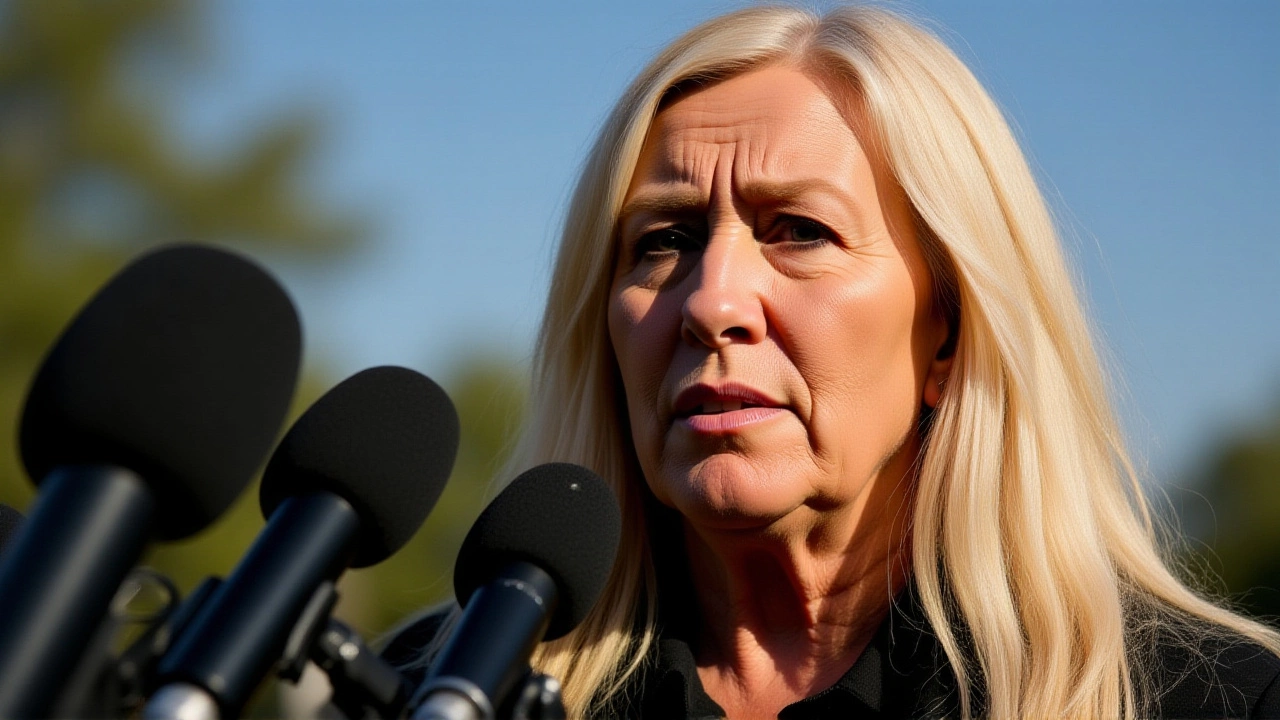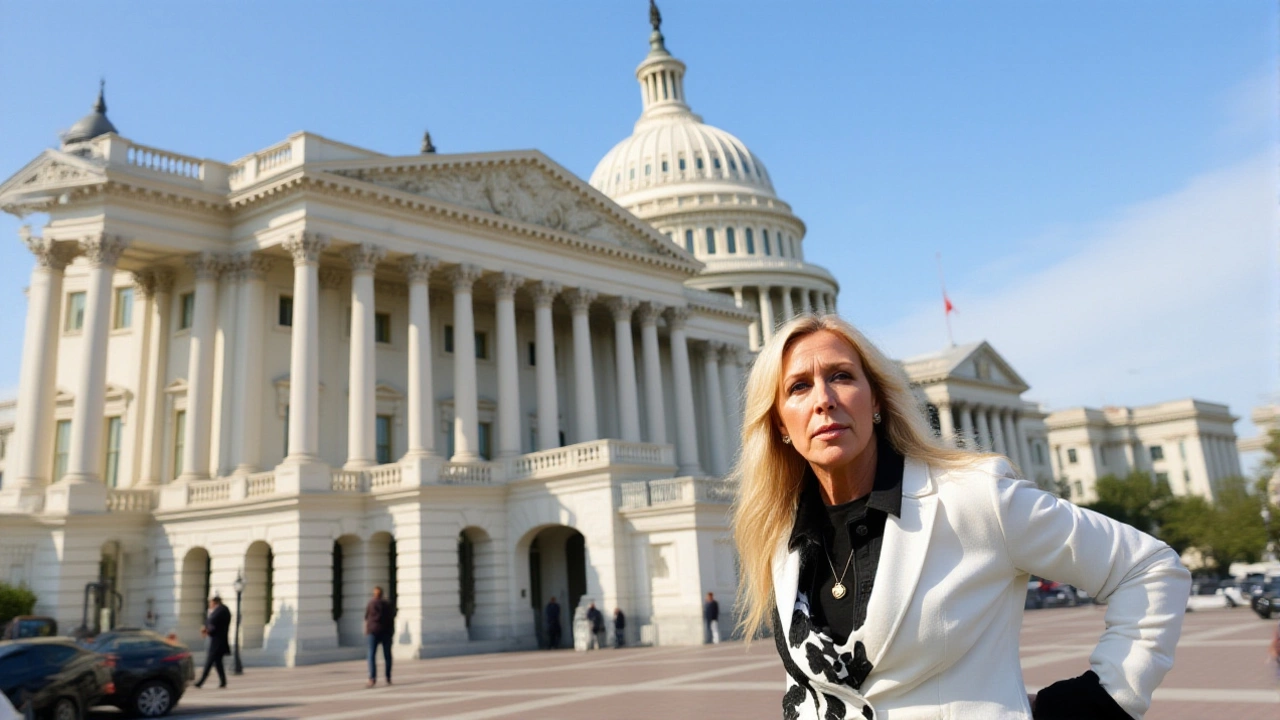Marjorie Taylor Greene Resigns to Avoid Trump Primary Challenge

On the evening of November 21, 2025, Marjorie Taylor Greene, the fiery Republican congresswoman from Georgia, dropped a political bombshell: she was stepping down from Congress — not because she lost, but because she refused to fight her own party’s most powerful figure. Her resignation, announced in a tearful video posted at 8:45 p.m. Eastern Time, takes effect on January 5, 2026, leaving 347 days of her term unused. The reason? A very public rift with Donald J. Trump, the former president and 2028 Republican frontrunner, who had just hours earlier claimed on social media that Greene was quitting because of "plummeting poll numbers." She didn’t just disagree with that narrative — she dismantled it.
"I Won’t Let Him Tear My District Apart"
"I have fought harder than almost any other elected Republican to elect Donald Trump and Republicans to power," Greene said in her statement. "But I do not want my sweet district to have to endure a hurtful and hateful primary against me by the president that we all fought for." The words were deliberate, emotional, and loaded. She didn’t say Trump was attacking her policy. She said he was attacking her district. That’s significant. Her district, Georgia’s 14th, is a reliably conservative stronghold with over 760,000 voters. A Trump-backed primary challenger would have turned it into a national circus — and Greene, despite her loyal base, knew she couldn’t win that fight without bloodshed.It wasn’t just about polls. Greene told CBS News correspondent Nicole Killian in a private conversation days before the announcement that she felt "threatened" — not physically, but politically. The language was telling. She didn’t say Trump was angry. She said he was coming for her. And she believed he had the machinery to crush her. That’s why she walked away. It’s the first time in modern U.S. history that a sitting member of Congress has resigned specifically to avoid a primary challenge from a former president. The Congressional Research Service confirmed it: unprecedented.
The Trump Fallout: From Ally to Adversary
Greene and Trump were once inseparable. She was his most vocal House ally, appearing at his rallies, defending him on impeachment, and even introducing legislation to ban TikTok after he told her to. But their alliance frayed over the summer. Sources close to the situation say the breaking point came after an alleged confrontation involving Elon Musk, CEO of Tesla, Inc. and X Corp.. Greene, who controls a massive social media following on X, reportedly pushed Musk to ban Trump critics on the platform. Musk, sources say, pushed back — and Trump, feeling sidelined, began publicly questioning her loyalty. By November 1, Trump had started criticizing her legislative record. By November 21, he’d declared her resignation was a sign of weakness.Greene didn’t just respond — she weaponized the moment. In her video, she didn’t mention Musk. She didn’t mention Twitter. She mentioned the Affordable Care Act tax credits set to expire on December 31, 2025 — credits her district relies on for healthcare affordability. "My colleagues in Republican leadership have ignored this for months," she said, directly naming House Speaker Mike Johnson. "They’re too busy chasing Trump’s approval to protect real people." That was a jab at the party’s establishment. And it worked. Within hours, conservative media outlets were echoing her frustration.

Georgia’s Special Election: A Political Earthquake
Under Georgia law, a special election must be called within 40 days of the vacancy. That means voting must occur between January 15 and February 4, 2026. Governor Brian Kemp has 10 days to issue the writ — meaning the clock is already ticking. The field is wide open. Already, three state legislators have signaled interest. So has a former Trump campaign manager from Augusta. But the real question isn’t who runs — it’s whether Trump will endorse anyone. If he does, the race becomes a referendum on his power. If he doesn’t? The GOP could fracture.Greene predicted Republican losses in the 2026 midterms. "We’re going to lose seats because we’re not governing," she said. "We’re just performing." That’s a rare admission from a Trump loyalist. It suggests she sees the party’s future as unstable — and she’s stepping aside before it collapses around her.
Why This Matters Beyond Georgia
This isn’t just about one district. It’s about the future of the Republican Party. Trump’s dominance has been absolute since 2016. But Greene’s resignation proves even his closest allies are starting to calculate the cost of loyalty. She didn’t leave because she was unpopular. She left because she was too popular — and Trump might have made her a target. That’s a dangerous precedent. If party leaders fear being challenged by their own former president, who will dare to lead?Her departure also raises a chilling question: Is this the beginning of a new era where former presidents control congressional seats like feudal lords? Or is it the last gasp of a system where loyalty is worth more than governance?

What Comes Next?
The special election will be a lightning rod. Polls show Greene’s district is still 18 points Republican, but turnout will be the key. If young voters, independents, and even moderate Republicans show up to reject a Trump-backed candidate, it could signal a quiet rebellion. If Trump endorses someone and wins by 20 points, it proves his grip is unshakable.Meanwhile, Greene plans to return to Georgia full-time. She’s not retiring. She’s repositioning. "I’ll be back," she said in her closing line, eyes glistening. "May God bless you all and may God bless America."
Frequently Asked Questions
Why did Marjorie Taylor Greene resign before her term ended?
Greene resigned to avoid a potential primary challenge from former President Donald Trump, whom she believed would run a "hurtful and hateful" campaign against her in Georgia’s 14th District. Despite having served as one of his most loyal allies, she concluded that a Trump-backed challenger would fracture her district and damage the GOP’s chances in the 2026 midterms. She chose to exit gracefully rather than risk a divisive battle she felt she couldn’t win.
What does Trump’s reaction reveal about his influence in the GOP?
Trump’s claim that Greene resigned due to "plummeting poll numbers" — a post he authored himself — shows he still controls the narrative. But the fact that Greene chose to step down instead of fight back suggests his influence may be more coercive than supportive. Even his closest allies now fear becoming collateral damage in his political battles. This incident marks a turning point: loyalty is no longer enough; survival now requires avoiding his wrath.
How soon will Georgia hold a special election to replace Greene?
Georgia law requires a special election to be held between 30 and 40 days after the vacancy occurs — meaning voting must take place between January 15 and February 4, 2026. Governor Brian Kemp must issue the writ of election by January 15, giving candidates just weeks to organize. With over 760,000 voters in the district, this race will be closely watched as a barometer of Trump’s enduring power within the Republican base.
What impact could this have on the 2026 midterm elections?
Greene warned that Republicans risk losing seats in 2026 because they’re focused on internal battles instead of governing. Her resignation could energize Democratic turnout in Georgia, especially if Trump backs a polarizing candidate. Conversely, if Trump avoids endorsing anyone and the GOP unites behind a moderate, the district may remain safe. Either way, the outcome will signal whether the party is moving toward unity or deeper fragmentation.
Is this the first time a sitting congressman resigned to avoid a former president’s primary challenge?
Yes. According to the Congressional Research Service, no sitting member of Congress has ever resigned specifically to avoid a primary challenge from a former president. While past figures like Newt Gingrich and Bob Dole faced internal party pressure, none were targeted by a former president seeking to install a loyalist. Greene’s move sets a new precedent — one that could reshape how future candidates view loyalty to party leaders.
What role did Elon Musk play in this conflict?
While not mentioned in Greene’s resignation statement, multiple sources tell CBS News that tensions escalated after Greene urged Elon Musk to ban Trump critics on X. Musk reportedly resisted, believing in free speech absolutism — a stance that clashed with Trump’s desire for tighter control over his digital base. Trump allegedly viewed this as Greene overstepping, leading to a cooling of their alliance. Though Musk wasn’t the root cause, his platform became the battleground where loyalty was tested.